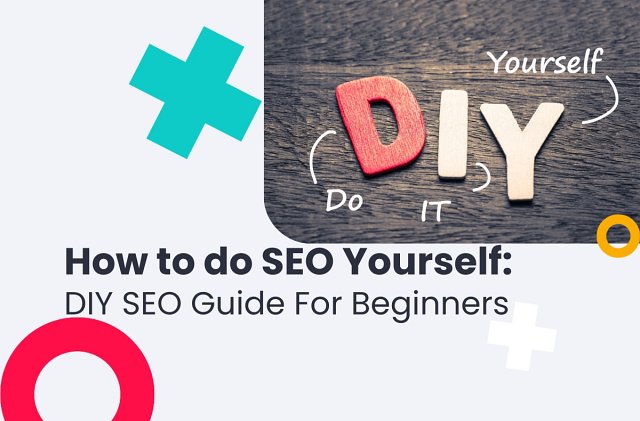(12 min. read)

DIY SEO — Setting Up Your Search Engine Optimization Foundation
Search Engine Optimization, or SEO, is the process of optimizing your website to improve its visibility in search engines — and by search engines we mean Google. When someone searches for information or products related to your business, SEO practices help your website appear prominently in those search engine results pages (SERP), increasing your chances of attracting organic (or unpaid) traffic.
Websites that rank higher in SERPs tend to get more clicks and traffic. Studies show that the top three results on Google receive the majority of clicks, while lower-ranked pages struggle to get noticed.
SEO is divided into three key components: on-page SEO, off-page SEO, and technical SEO.
- On-page SEO focuses on optimizing elements within your website, such as keyword-rich content, meta tags, internal links, and user experience, to improve relevance and engagement.
- Off-page SEO involves actions outside of your site, such as acquiring backlinks, managing brand mentions, content marketing, local SEO, etc.
- Technical SEO makes sure that your website is optimized for search engines and users by addressing site speed, mobile-friendliness, security, structured data, and proper use of XML sitemaps.
Together, these elements create a balanced strategy to improve your engine rankings and visibility.
Setting Up Analytics
Tracking and monitoring your website’s performance is fundamental in any SEO strategy. Analytics can provide insights into how visitors interact with your website, how they find it, and which areas need improvement. Without this, it’s nearly impossible to know whether your SEO is working or where to focus your efforts.
There are two essential tools every DIY SEO beginner should familiarize themselves with. The first one is Google Search Console — it helps you monitor how Google views your website and provides steps to take to fix existing problems. Google Analytics, on the other hand, provides deep insights into user behavior and traffic. Together, they form a basic tool set for any SEO strategy.
Researching Keywords and Relevant Search Queries
Keyword research helps you understand what your target audience is searching for and provides insights for content creation to meet their needs and align with the language they use. When you optimize your content with relevant keywords, you increase your chances of appearing in search results when users search for related topics.
The easiest way to start keyword research is to simply brainstorm your core topics — they will serve as a foundation for more specific keywords. Use tools like the Google Keyword Planner or Ahrefs keyword generator to discover related keywords and their search volume. Also, take a look at what keywords your competitors are targeting to identify opportunities for commonly searched and underutilized keywords.
Understanding Your Website’s Technical SEO
Technical SEO refers to optimizing your website’s infrastructure so that search engines can easily access and index your content, and so they know users have a good experience using it.
These adjustments keep your site functional and user-friendly, which are important positioning markers for Google. If search engines struggle to crawl your website or if it doesn’t meet certain technical requirements, it can harm your rankings, regardless of how good your content is.
Site speed is one of the most important technical SEO factors. Slow-loading websites frustrate visitors, leading to higher bounce rates and lower engagement. With the majority of searches now happening on mobile devices, mobile-friendliness is a crucial ranking factor for search engines as well.
Structured data markup is another essential tool that helps search engines better understand the content on your site by providing additional context. This can enhance the way your site appears in search results, offering rich snippets like ratings, prices, or other details, which can boost your visibility.
Additionally, make sure to upload an up-to-date XML sitemap to Google Search Console. This file helps search engines efficiently crawl and index your website, ensuring that all important pages are discovered and indexed quickly, improving your site's overall performance in search rankings.
Creating Optimized Content
Ever heard the phrase “Content is King”? It might be a little cheesy, but it definitely holds true. Search engines prioritize websites that offer high-quality, relevant content that satisfies the needs and intentions of users. Creating optimized content means crafting material that not only addresses the search queries of your audience but also follows SEO best practices to rank higher in search results.
Search engines like Google are constantly evolving to provide the best possible results for users. They now place greater emphasis on user intent, or what the searcher is actually looking for, rather than just matching keywords. They also look at the consistency of delivering valuable content and favor sites that keep their content up to date.
Gone are the days of keyword stuffing; today, keywords should naturally fit into the flow of the content. They should be present in key places like headings, subheadings, meta tags, and alt text for images, but always in a way that enhances readability and user experience.
For content to truly succeed, it needs to be engaging and well-structured. This means using clear and concise language, formatting that’s easy to skim (think short paragraphs, bullet points, and headings), and offering valuable insights or solutions that keep readers hooked.
Another important part of optimized content is incorporating internal and external linking. Internal links guide users to other valuable pages on your website, improving navigation and encouraging deeper exploration. External links, on the other hand, can enhance your content’s credibility by referencing reputable sources and further enriching the user’s experience.
Keeping content fresh is also key — regularly updating older posts with new information, adding recent statistics, or repurposing existing material for new formats (like turning blog posts into infographics or videos) not only keeps your content relevant but also signals to search engines that your site is active and up to date.
Optimizing On-Page Elements
High-quality content can be further optimized with on-page elements to earn even more relevant traffic from search engines. Elements such as page titles, meta descriptions, headers, and URLs help search engines understand your content better and make your website more attractive to users who browse search results.
The title tag is perhaps the most important of these elements. It tells both Google and users what the page is about, and should include your primary keyword, ideally at the beginning. Next, a meta description is a short summary of your page that appears below the title in search results. It doesn’t directly affect rankings, but can improve CTR by giving users an additional reason to click.
Headers help structure your content and also make it easier for both users and search engines to understand. They break up your content into sections and create a hierarchy of importance (H1 > H2 > H3, etc.). They should naturally include keywords, but avoid stuffing. Clean and descriptive URLs are also important on-page elements, and you might also want to optimize image alt text, or the text descriptions you provide for images on your page.
Building High-Quality Backlinks
Backlinks, or links from other websites that point to yours, are a crucial component of SEO. Google views these links as one website telling others that it can be trusted and information found there is trustworthy. This can significantly boost your rankings in search engine results pages, especially if high-authority websites point to your site.
High-authority, or established and trustworthy websites can have a much greater impact on your rankings when linking to your content than dozens of low-quality links from lesser-known sites. How to acquire such backlinks?
- Primarily by creating valuable content that people naturally want to link to. Original and informative content is more likely to attract backlinks, with comprehensive guides or tutorials often seen as authoritative resources, making them highly linkable.
- Guest blogging is another popular method for building backlinks. By contributing articles to other reputable websites in your industry, you can gain a backlink to your site in return. This way you can boost your backlinks for SEO and also increase your credibility and build a position as an expert in your field.
- Sponsoring events, networking with influencers and bloggers can help you earn additional backlinks through partnerships and collaborations. It’s important to establish genuine relationships with people in your industry to increase the chances that they will link to your content or recommend it to their audience.
When working on your SEO strategy, remember that link building is a critical factor in improving your website's authority and search rankings. Even if you're working with limited resources, there are creative and cost-effective ways to build high-quality backlinks. From leveraging partnerships to creating shareable content, you can maximize results without breaking the bank. For practical tips, check out our guide on Link Building on a Budget.
You can also choose to simplify your link building with WhitePress — our revolutionary content marketing platform provides 100,000+ high-DR websites for publishing external content, in addition to copywriting services in 32 languages by native copywriters. Try it now!
Tracking and Measuring Your Success
You’ll need to keep monitoring your strategy as you go to make sure it remains effective. Using webmaster tools like Google Analytics and Google Search Console, as well as dedicated SEO tools like Ahrefs and Semrush, you can track key metrics and measure the success of your SEO efforts.
Analyzing organic traffic sources helps you identify which keywords, content, and backlinks are generating the most visits to your website. You can also track conversions, keyword rankings, and other metrics important to your strategy to assess the return on investment of your SEO activities.
Google Analytics is a powerful and free tool that provides comprehensive data about your website’s traffic, including how users find your site, how they navigate through it, and what actions they take. It should always be your #1 tool when dealing with SEO, along with the Google Search Console, which offers insights specifically tailored to SEO and shows how your website performs.
Other tools like Ahrefs and Semrush include a wide range of useful functions to refine your SEO strategy further, including keyword rankings and keyword research, backlink analysis, competitor analysis, and more. Some of these features, however, might be locked behind a subscription.
Remember, SEO is an ongoing process. What was once considered best practices might not be effective at all anymore. Regular monitoring allows you to spot trends, identify areas of improvement, and optimize your strategy based on performance data.
Common DIY SEO Mistakes to Avoid
One of the most frequent mistakes beginners make is keyword stuffing—the practice of overloading a webpage with keywords in an attempt to manipulate search engine rankings. In the early days of SEO, this tactic may have worked, but search engines have become much smarter. Today, keyword stuffing can lead to penalties and damage your site’s credibility, so it’s better to use keywords sparingly and where it’s most effective.
Let’s step away from content for a second. Many DIY SEO practitioners focus heavily on content and keywords while neglecting technical SEO. However, if your website has poor technical health, search engines may struggle to crawl, index, and rank your pages properly, no matter how good your content is. Your users will also become frustrated and get driven away from your site. Conduct regular technical SEO audits using tools like Google Search Console or PageSpeed Insights to identify and fix issues as they arise.
Another common mistake is failing to consider user intent when optimizing content. Simply ranking for keywords is not enough if your content doesn’t match the needs and expectations of the user. If users land on your page but don’t find what they’re looking for, they will quickly leave, which can hurt your rankings. Whether the user’s goal is to gather information, navigate to a specific site, or make a purchase, your content should match their needs. Use keyword research tools and analyze the type of content currently ranking for your target keywords to better understand user intent.
Staying Up-to-Date with the Latest SEO Trends
As we already mentioned, search engine algorithms are frequently updated to provide better results to users, and strategies that worked a year ago may no longer be effective. To stay competitive, you need to be proactive in learning about changes in SEO practices and continuously revising your strategy.
We recommend following Google Developers Blog for the latest changes and updates in Google’s algorithm. Major updates can have a significant effect on how websites are ranked (see Google Panda or BERT), so by staying informed you can adjust your strategy accordingly and avoid sudden drops in rankings. Some SEO techniques also become less effective over time or even penalized, such as keyword stuffing or excessive link exchanges, which is very important to be aware of.
Following trusted SEO blogs and news sites is also a great way to stay informed about algorithm changes, new strategies, and any updates to best practices. Many of these are written by industry experts who provide timely and practical advice, such as the Moz Blog or Ahrefs blog.
Webinars and conferences provide a great opportunity to learn directly from industry experts. Many webinars offer in-depth sessions on emerging SEO trends, algorithm changes, and new tools. Conferences, whether virtual or in-person, often feature presentations by SEO leaders and offer opportunities for networking.
Taking Your DIY SEO to the Next Level
Once you’ve laid the foundation for your SEO strategy and have begun to see results, the next step is to fine-tune your efforts to achieve even greater growth. Regular SEO audits are a great way for making sure your website remains optimized and competitive, and involve a thorough analysis of your website’s technical health, content, and overall performance. This process helps you spot opportunities for improvement and fix any issues that may be holding your site back from ranking higher.
SEO Audits can help you:
- Identify and fix technical issues
- Keep up with algorithm changes
- Optimize content and keyword strategy
- Improve user experience
As your website and business grow, you may reach a point where professional help is necessary to achieve further growth. Consulting with an SEO expert or hiring an agency can provide valuable insights, advanced strategies, and the expertise needed to take your SEO to the next level. However, it’s essential to evaluate your specific needs, budget, and goals before deciding. If you’ve already seen success with DIY SEO but want to scale faster or tackle more advanced challenges, consulting with an expert may be the right move.



